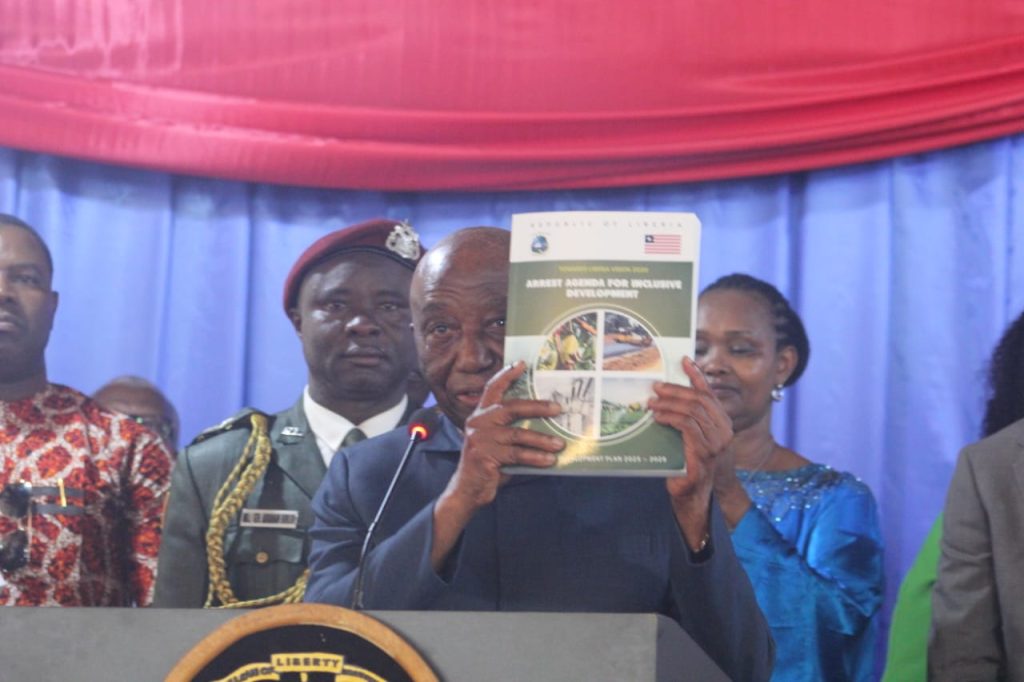Liberia embarked on a new path towards national development with the launch of its ambitious five-year National Development Plan, termed the ARREST Agenda for Inclusive Development (AAID), coupled with complementary County Development Agendas (CDAs). This comprehensive strategy, unveiled in January 2025 by President Joseph Nyuma Boakai, represents a culmination of extensive nationwide consultations involving all administrative districts, counties, and budget sectors. The plan, developed collaboratively with diverse stakeholders, seeks to align national priorities with regional and continental development objectives, drawing lessons from previous development initiatives, including the Poverty Reduction Strategy, the Agenda for Transformation, and the Pro-Poor Agenda for Prosperity and Development. With a substantial budget of US$8.4 billion, the AAID is poised to drive transformative change across six key pillars: agribusiness, roads and infrastructure, rule of law and governance, education and human capital, sanitation, and tourism, spanning the period from 2025 to 2029.
The AAID is designed to tackle the multifaceted challenges hindering Liberia’s progress, including high unemployment, low literacy rates, pervasive poverty, inadequate infrastructure, and deeply rooted structural inequalities exacerbated by instability. President Boakai emphasized the need for a collective national effort and a shift in mindset, recognizing the inherent potential within every Liberian to contribute to national development. The plan promotes innovative solutions that prioritize inclusivity, sustainability, justice, good governance, and equality, ensuring that the voices of all citizens, particularly women, youth, and vulnerable populations, are heard and considered. The President underscored the importance of aligning the AAID with global development frameworks such as the Sustainable Development Goals, Africa’s Agenda 2063, and ECOWAS Vision 2050 to ensure a holistic and sustainable approach.
The AAID serves as a crucial roadmap towards achieving Liberia’s Vision 2030, aspiring to elevate the nation from its current challenges to lower-middle-income status. President Boakai stressed the imperative of collective action to embrace good governance, revitalize the economy, modernize infrastructure, and improve education and healthcare. A robust implementation framework, led by a National Steering Committee under the President’s leadership and supported by the UN country team and dedicated technical teams at all levels, is in place to ensure effective execution. Mutual accountability is emphasized to ensure that allocated resources achieve the desired outcomes, and monitoring and evaluation are central to maintaining transparency, accountability, and continuous improvement throughout the plan’s implementation.
Finance Minister Augustine Kpehe Ngafuan outlined the AAID’s ambitious economic targets, including a projected 37% increase in GDP, raising it from US$4.75 billion to US$6.5 billion. This growth is expected to translate into a 23.6% increase in per capita GDP, from approximately US$850 to US$1,050, alongside significant job creation and formalization of existing employment. Beyond economic growth, the plan focuses on improving human capital, aiming to increase life expectancy, reduce maternal mortality rates, and significantly decrease the multidimensional poverty rate. These advancements are projected to elevate Liberia’s ranking on the SDG index by seven places, contributing significantly to the nation’s journey towards achieving lower-middle-income status by 2029 and enhancing the lives of its citizens.
The launch of the AAID and CDAs was met with positive reception and a commitment to collaborative implementation. Senate President Pro-Tempore Nyonblee Kangar Lawrence expressed the Senate’s commitment to providing recommendations and support for the plans. The Ministry of Finance presented the overarching AAID, while representatives from each of Liberia’s 15 counties presented their respective County Development Plans, demonstrating a localized and participatory approach to development. President Boakai accepted these plans, pledging to adopt them as working tools for his administration. This comprehensive and inclusive process underscores the government’s commitment to ensuring that the AAID is not just a national plan, but a reflection of the collective aspirations and needs of all Liberians.
The AAID represents a crucial step forward for Liberia, aiming to address long-standing development challenges and chart a course towards a more prosperous and equitable future. The plan’s emphasis on inclusivity, sustainability, and good governance, coupled with its robust implementation framework and commitment to monitoring and evaluation, provides a strong foundation for achieving its ambitious goals. The collaborative approach involving all levels of government, civil society, and development partners further strengthens the likelihood of success, fostering a sense of national ownership and shared responsibility for Liberia’s development trajectory. The world will be watching to see if Liberia can finally achieve its potential and emerge as a thriving nation in West Africa.














